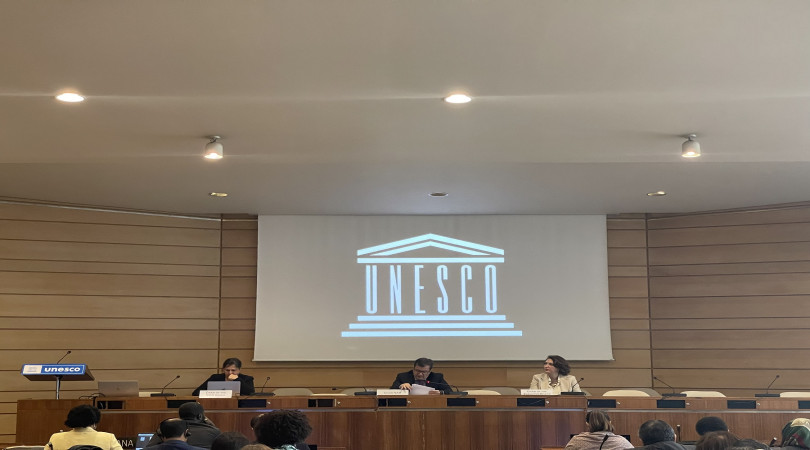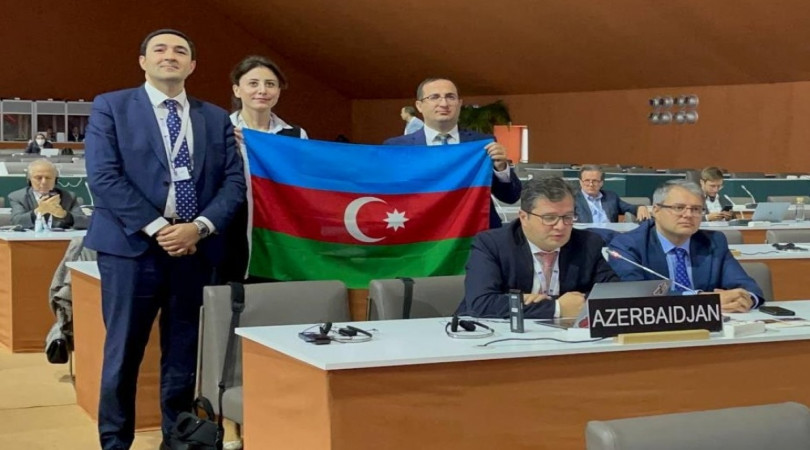Rich historical and cultural heritage of the Karabakh Khanate was presented at the UNESCO Headquarters
A series of events continue within the framework of the "Year of Shusha" announced by the Decree of the President of the Republic of Azerbaijan Ilham Aliyev.
Within the framework of the "Year of Shusha", a conference called "Intra-regional cooperation in revealing and preserving tangible cultural heritage" is being held at the UNESCO Headquarters. An album-book entitled "Karabakh Khanate: historical and cultural identity" published under the auspices of the Heydar Aliyev Foundation and the support of the Ministry of Foreign Affairs of Azerbaijan was also presented at the Conference. Through this book, the historical and cultural identity of the Karabakh Khanate is introduced in various countries, as well as in international organizations.
The conference was opened by the Permanent Delegate of Azerbaijan to UNESCO, Elman Abdullayev. He assessed the research project as a contribution to the demand for international cooperation on the protection of cultural heritage arising from the 1972 World Heritage Convention.
French journalist Jean-Michel Brun, the moderator of the event, emphasized that the cultural heritage of the Karabakh region, which is part of Azerbaijani culture, such as mugham, architecture, carpet weaving, and horse riding, are the pearls of human culture.
The Director of the National Museum of Georgia, the famous archaeologist Professor David Lordkipanidze, informed about the unique projects that have been carried out in recent years with the support of the Heydar Aliyev Foundation in the archives of the National Museum of Georgia in the direction of discovering the material evidence of the rich historical and cultural heritage of Azerbaijan. As a result of this cooperation, the "Masterpieces of History" exhibition organized a few years ago at the Heydar Aliyev Center made it possible for a wide foreign audience to get to know rare exhibits related to the history and cultural heritage of the Irevan Khanate discovered in the funds of the National Museum of Georgia.
Professor Eldar Nadiradze, the head of the group of co-authors of the book "Karabakh Khanate", noted that this research work, prepared on the basis of objective ethnographic materials collected during the Russian Empire, reflects and proves the superior position and deep historical roots of Azerbaijani culture in the Karabakh region for many centuries.
Expressing his gratitude to his Georgian colleagues for their dedicated work, the head of the department in the Azerbaijan History Museum spoke about the cultural heritage of the Karabakh Khanate as a continuation of the millennial culture of the historical Azerbaijani states that ruled the region before it.
"During my visit to the liberated Karabakh, I witnessed the barbaric destruction of the Azerbaijani heritage as a result of the 30-year Armenian occupation," - said Daniel Pomier Vincelli, a researcher at the Sapienza University of Rome.
Concluding the discussions, the Ambassador-at-Large at the Ministry of Foreign Affairs of Azerbaijan, Elshad Iskanderov, said that the heritage of Azerbaijan was completely destroyed by the armed forces of Armenia in the Karabakh region during the years of Armenian occupation. In this regard, he emphasized that the in-depth study of the heritage of the Karabakh Khanate preserved in foreign museums is of particular importance in terms of uncovering historical truths.
He noted that the "Year of Shusha" initiative, announced by the Decree of the President of Azerbaijan Ilham Aliyev, encourages the international research and promotion of scientific facts about the Azerbaijani identity of the Karabakh region, especially the ancient city of Shusha. It is in the "Year of Shusha" that under the auspices of the Heydar Aliyev Foundation, the rich collection of the history of the Karabakh Khanate, which existed in the archives of Tbilisi for more than 100 years, was published in the form of a prestigious scientific publication, and the first presentation of this publication was held in the liberated Shusha, which has a deep symbolic meaning. E. Iskanderov expressed confidence that the research of Georgian scientists in this direction will continue to be the center of attention of the wide historical and cultural community.
At the end of the event, the speakers answered the questions of the participants.
The participants of the event were presented with the book "Karabahh Khanate" in English, French and Arabic languages.
.jpeg)
.jpeg)
.jpeg)
.jpeg)
.jpeg)
.jpeg)
.jpeg)
.jpeg)
.jpeg)
.jpeg)
.jpeg)
.jpeg)
.jpeg)
















